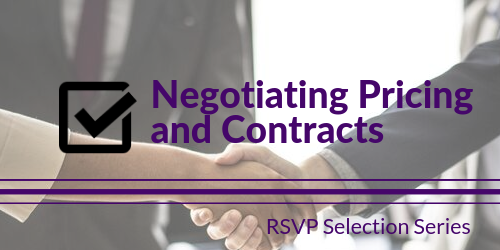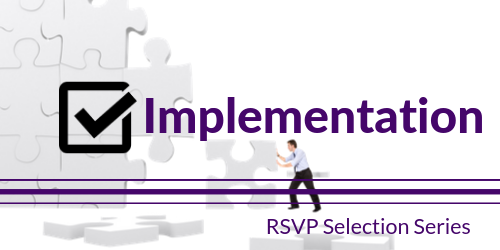Tech Select Series: Negotiating Pricing and Contracts
Welcome back to the latest entry in RSG's "Real Story Vendor Procurement" (RSVP) best practice series.
Last time we showed how to conduct a competitive bake-off. In this segment we're going to talk about everybody's favorite topic, negotiating pricing and contracts. Of course, this part can seem kind of tedious, but it's critically important to obtain not only the best prices and terms for your enterprise, but to make sure the structure of the deal works for you in the long run.
Early and Often
The most important message here is that you want to start your negotiations early and continue them throughout the selection process. This runs counter to many traditional approaches where you leave price and contract negotiations to the very end of the technology selection process. That's a mistake.
Problems with Delayed Negotiations
1. First, you lose your competitive leverage. If the vendor knows they are the finalists, they're incented to hold out a little bit harder.
2. Time is working against you and vendors know this. You've made the selection. Now you want to close the deal.
3. It can be a time-consuming process where there's inevitable delays, so if you get started earlier and work in parallel, you're more likely to finish sooner.
Start Negotiations After You've Received Proposals
We recommend starting the process right after you received the proposals or at a minimum after you down select from the proposal to the demo phase. This means you may be negotiating with multiple vendors. It also means that some of the vendors are likely to push back because it's in their interest to wait and negotiate with you later. And here's how you respond to that. What you say is contract and financial terms are part of your evaluation process and vendors have to play along if they want to continue to have a shot in that process.
Contract Terms
It's very important to get a draft of their contract as part of the initial proposal so you can run it by your legal team. For cloud or software as a service contracts, look at the SLA very, very closely, particularly around issues of data ownership, access and security. You'll be surprised at how customer unfriendly many cloud SLAs are.
Pricing
- Leverage your Excel skills. Put the bidder's figures into your spreadsheet and then confirm with the vendor, are these figures right? Make sure you include any optional modules because the vendor may not have bid them at first. Then develop a five year total cost of ownership or TCO and make sure that includes maintenance and support.
- The goal is to make sure you've got the right baseline before you start negotiating. Of course, you want to push for discounts. There are certain areas where vendors will be more and less flexible. Often, it's tougher to get discounts on things like consulting fees and maintenance and support, but it's possible.
- You will find more aggressive discounting in your capital expenditures. In other words, up front licensing fees. We find enterprise segments can get anywhere from 40 to 60% off list price.
- For hosted or SaaS solutions where you pay on a monthly basis there is an opportunity to negotiate. Don't buy more seats or server licenses than you need. That gives the vendor an incentive to stay invested in your success. Where possible tie your purchases to actual business goals, like creating a new service line or creating new collaboration capabilities within your enterprise.
- Some vendors will push back against this incremental purchase approach. The salesperson's job is to get as much revenue out of you upfront and then hand you off to an account rep. Try to resist this model and instead plan to purchase in increments as you need the software, as opposed to everything upfront.
- Remember that your internal sourcing/procurement colleagues can be very helpful here; they have experience negotiating with vendors and often understand where the bodies get buried in legalese.
Next Steps
In RSG's evaluation research we dig into which vendors address certain scenarios better than others. While not always by vendor design, some products will fit better — or worse — for different use cases.
If you work for a large, or global, or complex enterprise, RSG's vendor evaluations are designed to address the specialized strategic considerations you face.
See for yourself by perusing a complimentary sample.
The next edition of the RSVP selection series will cover Piloting Your Solution. See you next week....
Other Posts in the RSVP Selection Series
Establish Business Foundations
Identify Needs and Opportunities:
Conduct Market Analysis:
Communicate with Suppliers:
Try Before You Buy:
Make the Right Choice
- Negotiating Pricing and Contract (you are here)
- Pilot Solution (coming next week)
What's Next
- Implementation (coming later)






![[Webinar] The Right Way to Select Technology for Your New Omnichannel Stack](/sites/default/files/styles/blog_thumbnail/public/blog/Omnichannel%20Stack%20Selection%202020%20small.jpeg?itok=-u84mYo8)


